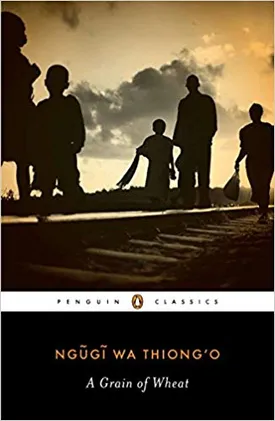Ngugi wa Thiong’o
Ngugi wa Thiong’o is a celebrated Kenyan author, scholar, and playwright who has become a leading icon in post-colonial literature. His works have won countless awards and prizes, and his works have been translated into more than 30 languages, making him internationally known. A renowned public intellectual and political activist who often speaks about issues such as neocolonialism, classism and imperialism, Ngugi has been an influential figure in works of English and Gikuyu language.
Ngugi wa Thiong’o was born James Thiong’o Ngugi on October 5, 1938 in Kamirithu, Kenya. He was born to the Kikuyu people, who are the largest ethnic group in Kenya. His childhood was spent in herding and working the land, and he recalls great memories of exploring the Kenyan countryside with his friends and parents. He attended the missionary schools run by British colonizers and in 1964, Ngugi moved to England to attend university. He studied at Makerere University in Uganda, then later earned an MA from Leeds University and eventually finished his Ph.D. Ngugi proudly proclaimed that he was the first “well-known Kenyan to speak with a British accent”, and this showed his enthusiasm to assimilate into British culture while still retaining his Kenyan identity. His academic career flourished as he wrote, taught and lectured extensively at universities both in Africa and the United States.
Ngugi's works challenge the oppressive forces of neo-colonialism. His works deconstruct the cycle of power imbalances and inequalities between Africans and the western world. He consistently depicts the African people’s right to existence and their unhindered traditional communities.
One of Ngugi’s most celebrated works is Weep Not, Child, which was published in 1964. It is a story of a Kenyan family’s struggle during the Mau Mau uprising against British colonists. This novel was very timely and helped to shape the public dialogues on the struggles for Kenyan independence. In this powerful story, Ngugi tells the story of Njoroge, a teenage boy, who has to cope with the impacts of the uprising and tries to find solace and strength in the midst of violence and chaos.
Ngugi is most well known for his later works. Petals of Blood (1977) centers around four characters in a town called Illost, who are struggling with the legacy of colonization, classism and cultural displacement. His novel Matigari (1986) is an eye-opening satire which depicts theKenyan people’s struggles against imperialism. His book Wizard of the Crow (2006) is an ambitious, insightful novel which follows the life of a Kenyan ruler and his struggle with religious hypocrisy and neocolonialism.
Ngugi has been awarded numerous distinctions such as the Senghor Prize in 1997 and the Maytlle-Monod Prize in 2005. Throughout his career, Ngugi has been recognized globally for his efforts to use literature to inspire and educate generations to come. Internationally, he has been praised for his eloquence and for his ability to tell stories that capture the lingering effects of colonialism and oppression. His works are also noted for being rooted in historical events, folk tales and cultural traditions that highlight African pride and cultural diversity.
Ngugi wa Thiongo remains one of the most celebrated, influential and important authors in the post-colonial literature movement today. His powerful works, which explore the legacies of neoliberalism, racism and colonialism, have left a lasting legacy in the literary world. His voice, inspiring messages and powerful works continue to bring attention to the struggles of collective liberation against oppressive forces.

